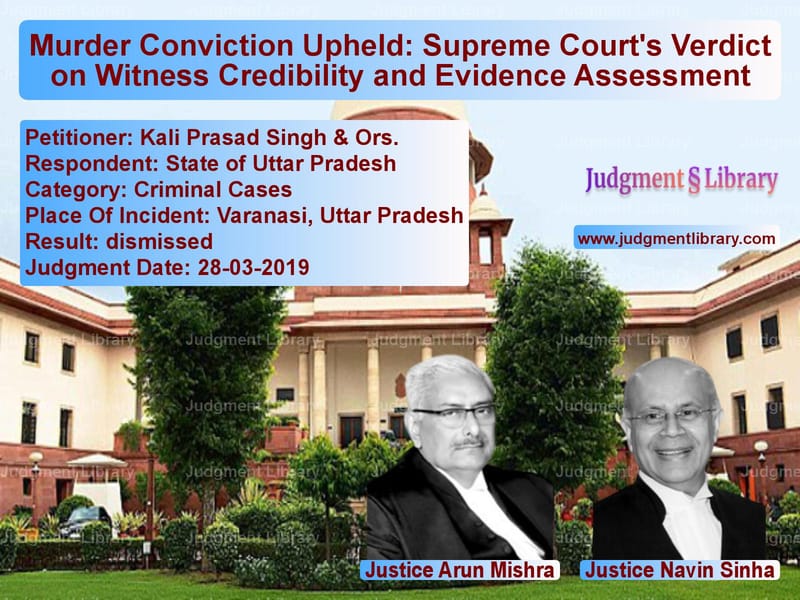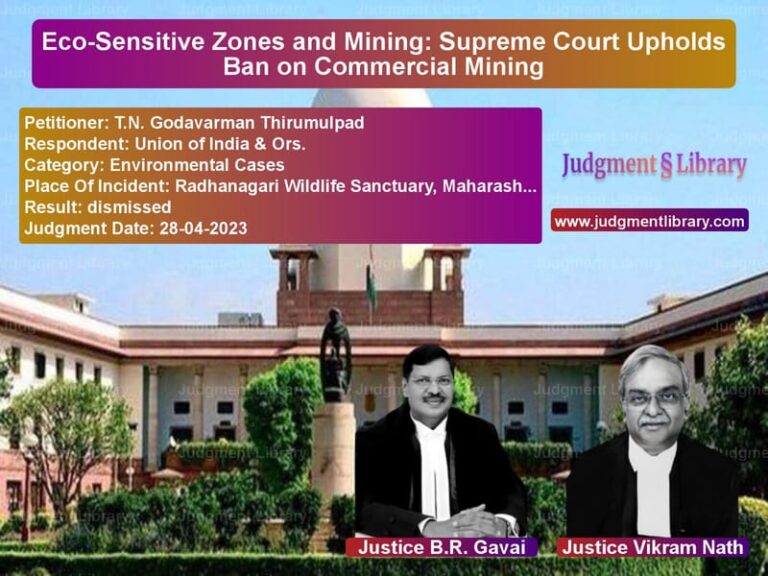Murder Conviction Upheld: Supreme Court’s Verdict on Witness Credibility and Evidence Assessment
The Supreme Court of India, in the case of Kali Prasad Singh & Ors. v. State of Uttar Pradesh, upheld the conviction of the appellants for murder under Section 302 of the Indian Penal Code (IPC). The Court dismissed the appeals challenging the judgment of the High Court, which had affirmed the decision of the Sessions Court convicting the accused for the murder of Surendra Singh.
Background of the Case
The case originated from a brutal murder that took place on February 18, 2000. The prosecution’s case was based on the complaint lodged by Rajendra Singh, the brother of the deceased Surendra Singh. The complainant was preparing for civil services in Allahabad, while his brothers, including the deceased, resided in Varanasi.
On the night of the incident, at around 10:00 PM, Rajendra Singh and his brother Surendra were walking home when they were attacked near the house of Pramod Dubey. The accused, Kali Prasad @ Paintol and Santosh Kumar Singh, armed with country-made pistols, ambushed Surendra Singh and shot him in the neck and temple. The complainant immediately raised an alarm, prompting a nearby constable, Nepal Singh (PW-3), to rush to the scene. The assailants, however, managed to escape. Surendra Singh succumbed to his injuries on the spot.
Trial Court’s Findings
The prosecution presented eight witnesses, with Rajendra Singh (PW-1) being the sole eyewitness. Other key witnesses included:
- PW-2 Sanjay Kumar Rai: A supporting witness.
- PW-3 Constable Nepal Singh: Arrived at the crime scene immediately after hearing gunshots.
- PW-4 Constable Uma Shanker Singh: Recorded the First Information Report (FIR).
- PW-5 SI R.P. Rai: Conducted the inquest report.
- PW-6 Inspector M.S. Chaudhary: Investigated the crime scene.
- PW-7 SI Ashok Kumar Pandey: Led the investigation under the Arms Act.
- PW-8 J.P. Tripathi: A forensic expert.
The prosecution produced evidence linking the accused to the crime, including the recovery of a country-made pistol and 12-bore cartridges from Kali Prasad Singh.
The Sessions Court convicted both accused under Section 302 IPC and sentenced them to life imprisonment, imposing a fine of Rs. 5,000 each.
Appeal Before the High Court
The accused appealed to the Allahabad High Court, arguing that the prosecution’s case was fabricated. The defense contended:
- The prosecution’s version was doubtful as there was no corroborative evidence apart from the testimony of Rajendra Singh (PW-1).
- The FIR was allegedly ante-timed (filed after deliberation and modification).
- There were inconsistencies in the presence of artificial lighting at the crime scene, which could cast doubt on the identification of the accused.
- The bullet wounds did not show signs of blackening, suggesting the shots were not fired at close range as claimed.
However, the High Court dismissed the appeal, affirming the conviction and sentence.
Supreme Court’s Analysis
The Supreme Court examined the case on multiple legal aspects, primarily focusing on:
1. Credibility of the Eyewitness
The Court emphasized that the sole testimony of an eyewitness, if credible, is sufficient for conviction. It held:
“We find that [Rajendra Singh’s] version is quite truthful. He has clearly stated the sequence of events, identified the accused, and his testimony is corroborated by medical and forensic evidence.”
2. Allegations of an Ante-Timed FIR
The defense argued that the FIR was fabricated and filed after police intervention. The Court rejected this claim, citing:
“A bare perusal of the FIR indicates that there is no correction as to the time of the offense or the date on which it has been recorded. The FIR was lodged without delay.”
3. Availability of Light at the Crime Scene
The accused challenged the visibility at the scene, arguing that there was no artificial light. However, the Court found:
“There was sufficient light from the house of Pramod Dubey. The boundary wall was only 2.5 feet high, which would not have obstructed the light.”
4. Gunshot Blackening Issue
The defense contended that the absence of blackening on the wounds indicated that the shots were fired from a distance, contradicting the prosecution’s case. The Court dismissed this argument, stating:
“Since the deceased was wearing a hooded jacket, blackening marks may not have been visible. The shots were indeed fired at close range.”
5. Post-Mortem and Medical Evidence
The forensic expert confirmed that the injuries were caused by gunshots fired from a short distance, reinforcing the prosecution’s case.
Final Judgment
The Supreme Court concluded that the conviction was justified based on the evidence and dismissed the appeal.
“We find that the prosecution has proved the case beyond reasonable doubt. The High Court and the Trial Court have rightly convicted the appellants under Section 302 IPC.”
The life sentence imposed by the lower courts was confirmed.
Key Takeaways
- Eyewitness Testimony Holds Strong Legal Weight: The Court reiterated that a single, credible eyewitness can be the basis of conviction.
- Timely Filing of FIR is Crucial: The judgment dismissed the argument of an ante-timed FIR, reinforcing that immediate reporting strengthens prosecution cases.
- Medical and Post-Mortem Reports Are Critical: The Court relied on medical findings to reject defense arguments regarding blackening.
- Artificial Light at Crime Scene Can Be a Decisive Factor: The Court examined the presence of light and found that the accused could have been identified.
Conclusion
The Supreme Court’s judgment in Kali Prasad Singh & Ors. v. State of Uttar Pradesh reaffirms that a well-substantiated prosecution case can withstand appellate scrutiny. By addressing key defense arguments and upholding the lower courts’ findings, the verdict reinforces principles of criminal jurisprudence, ensuring justice for the victim’s family.
Petitioner Name: Kali Prasad Singh & Ors..Respondent Name: State of Uttar Pradesh.Judgment By: Justice Arun Mishra, Justice Navin Sinha.Place Of Incident: Varanasi, Uttar Pradesh.Judgment Date: 28-03-2019.
Don’t miss out on the full details! Download the complete judgment in PDF format below and gain valuable insights instantly!
Download Judgment: Kali Prasad Singh & vs State of Uttar Prade Supreme Court of India Judgment Dated 28-03-2019.pdf
Direct Downlaod Judgment: Direct downlaod this Judgment
See all petitions in Murder Cases
See all petitions in Bail and Anticipatory Bail
See all petitions in Judgment by Arun Mishra
See all petitions in Judgment by Navin Sinha
See all petitions in dismissed
See all petitions in supreme court of India judgments March 2019
See all petitions in 2019 judgments
See all posts in Criminal Cases Category
See all allowed petitions in Criminal Cases Category
See all Dismissed petitions in Criminal Cases Category
See all partially allowed petitions in Criminal Cases Category







